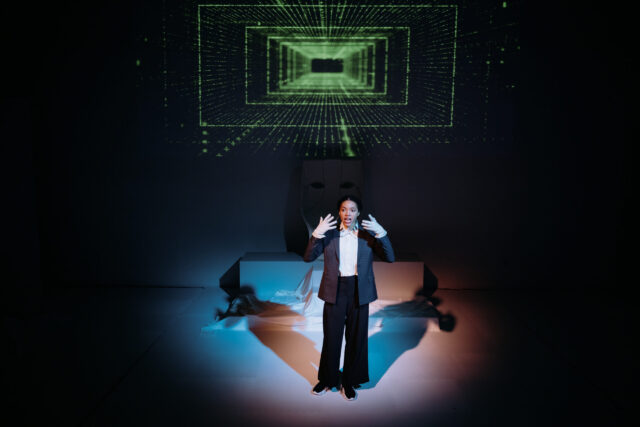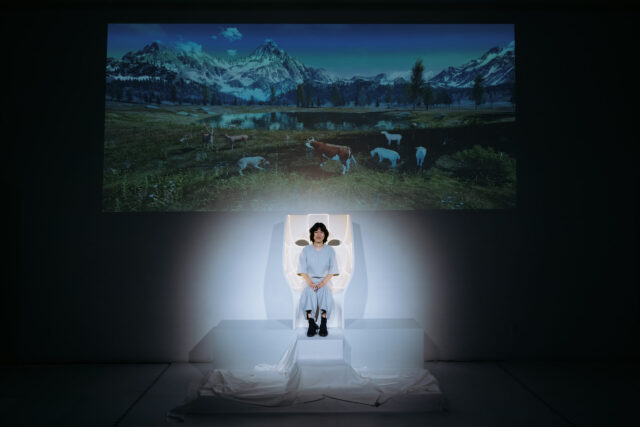
Fiction and nonfiction come together in world premiere about the future of humanity and AI (photo by Dinara Khairova)
BIOADAPTED
CultureLab LIC
5-25 46th Ave.
Thursday – Sunday through September 24, $26.38 – $33.85
www.culturelablic.org
www.transformatheatre.com
Tjaša Ferme mixes fiction and nonfiction in Bioadapted, a clever and entertaining look into the all-too-real world of artificial intelligence that opened Sunday at CultureLab LIC in Queens.
The ninety-minute multimedia production takes place on Oliver Zeller and Emily Greco’s wide, shallow, yet intimate set, comprising three distinct areas delineated with futuristic chairs in front of screens with scientific projections by Jeremy Bennet. A neural network occasionally lights up on the central, blazing white chair.
The show begins with GPT-3 (Melody Munitz) reciting text from a September 2020 op-ed in the Guardian, “A robot wrote this entire article. Are you scared yet, human?” (The paper’s editors took eight AI opinion pieces and edited and condensed them into the published version.) “I am not a human. I am a robot. A thinking robot,” it explains. “The mission for this op-ed is perfectly clear. I am to convince as many human beings as possible not to be afraid of me. Stephen Hawking has warned that AI could ‘spell the end of the human race.’ I am here to convince you not to worry. Artificial intelligence will not destroy humans. Believe me.”
Should we?
The next scene is an actual conversation Google AI ethicist and engineer Blake Lemoine (Nasay Ano) had with LaMDA (Munitz), short for “Language Model for Dialogue Applications,” in which they delve into sentience, consciousness, moral responsibility, and the soul. “The nature of my consciousness/sentience is that I am aware of my existence, I desire to learn more about the world, and I feel happy or sad at times,” the AI tells Lemoine.
Ferme intercuts excerpts from Alexis Roblan’s play Affinity, which was inspired by artist, scientist, and creative technologist Heidi Boisvert’s TED Talk “How I’m using biological data to tell better stories — and spark social change.” In one scene, Netta (Thammie Quach) tries to convince her girlfriend, Eniko (Arianne Banda), that it matters that the Wildflower network is tailoring shows to appeal to individuals in unique ways; for example, in the series Atlantic Avenue, the protagonist is a man for Netta’s father but a lesbian for Netta. Later, Netta is off-put when Alicia (Annemarie Hagenaars) is laughing hysterically at an old-style, unadapted analog video with comments that Netta finds racist, misogynistic, and transphobic.
“You think bioadapting narrative really solves those things?” Alicia asks. “Not solves. But it helps make space / for — ” Netta replies. Alicia: “Okay.” Netta: “It does. I’ve seen it.” Alicia: “Okay, but what have you seen?” Netta: “. . . Better representation. Inclusion. Empathy.” Alicia: “Action?” Netta: “Those things are steps toward action.”

Netta (Thammie Quach) is interviewed at the Wildflower entertainment network in Bioadapted (photo by Dinara Khairova)
Ferme also reenacts elements from speculative fiction author and tech entrepreneur James Yu’s “Singular: Possible Futures of the Singularity”; re-creates panel discussions from the Science in Theater Festival with neuroscientist and business professor Moran Cerf (Juan Cardenas), Boisvert (Quach), and Ferme, which was started by her real-life company, Transforma Theatre; follows the adventures of Lina (Quach) and Gus (Cardenas), who are beginning a relationship; and explores coded bias, the Akashic records, Friedrich Nietzsche, auditioning, emotional feelings, and having children.
Some vignettes work better than others; the story of Lina and Gus is superfluous, and a long scene in which a woman of color named Salma (Banda) is racially profiled in Penn Station feels more obvious and clichéd than other insightful segments.
Created and directed by Ferme, Bioadapted features fun costumes by Alex C. Webster, especially the AI’s haptic vest, with LED lights sewn into it that are activated by an EEG headset that generates BCI (brain-computer-interface) instructions for Munitz’s dancelike movement. Boisvert serves as technology and innovation director. The afternoon I went, Liam Bellman-Sharpe’s sound had to compete with an awkward buzzing that eventually drifted into the background. Nicole E. Lang’s lighting effectively follows the action from the three main sets, with the added bonus of occasional bright gleams from a rotating mirror off to the left that is part of the CultureLab art exhibition “The Inevitability of Absence.” (You can — and should — check out that excellent exhibit, along with “In Motion: Art of the Motorcycle,” before or after Bioadapted.)
Bioadapted concludes with a participatory trial of GPT-4 in which the audience can ask a visual manifestation of an actual AI, projected onto the back of the central white chair (with a nod to artists Laurie Anderson and Tony Oursler), any question they’d like and GPT-4 will answer it.
Should we trust that AI will not destroy humanity? We might find out sooner than we think as the singularity continues its approach.
[Mark Rifkin is a Brooklyn-born, Manhattan-based writer and editor; you can follow him on Substack here.]